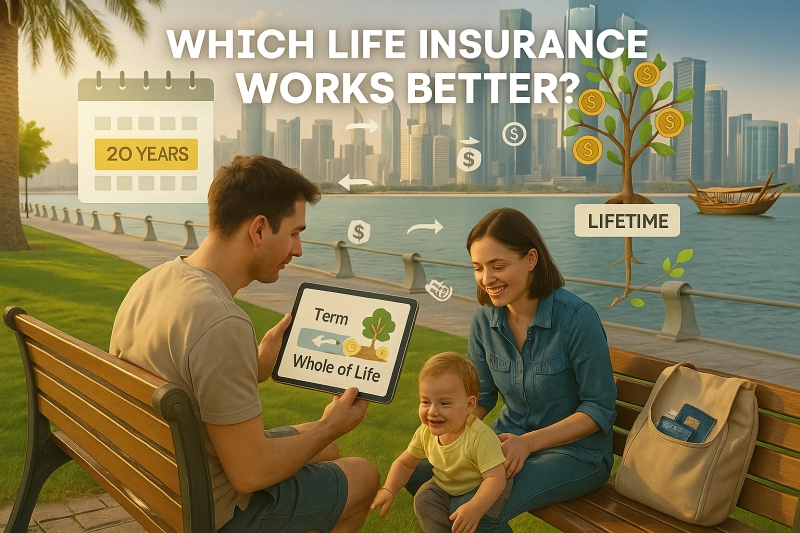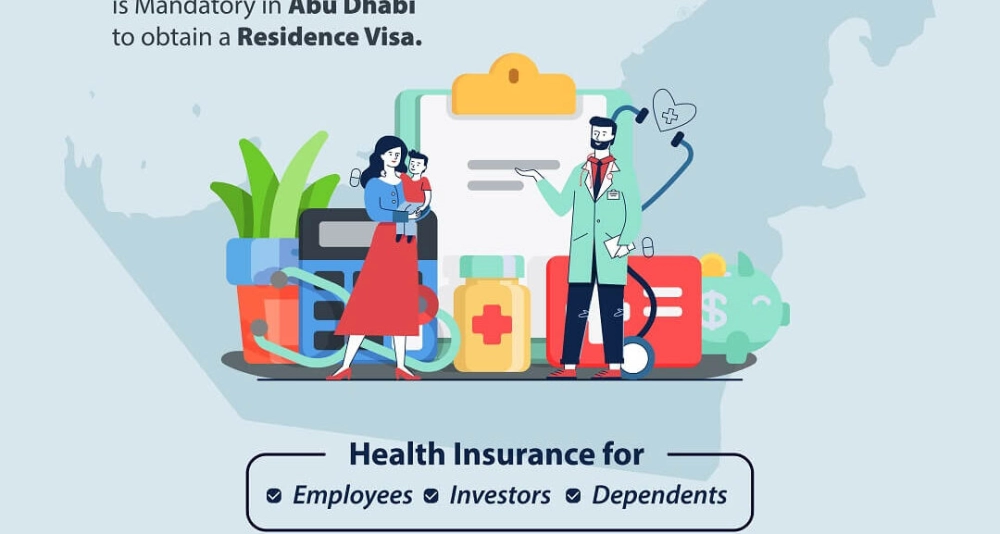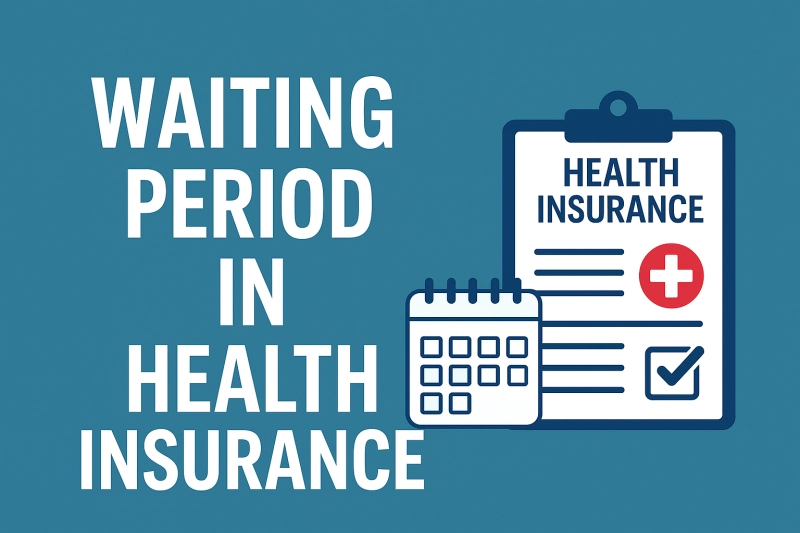Choosing life cover in a country that is not your birthplace can feel complicated: unfamiliar regulations, multiple currencies, and a stay whose duration is sometimes uncertain. Yet one question remains the same for almost every expat who contacts us at InsuranceHub: “Should I buy term life insurance or whole of life?”
Below you will find a practical, Abu Dhabi-specific guide that breaks down the two products, shows real-world cost examples, and gives you a decision checklist you can use before talking to an advisor.
30-second take-away
Term life is pure protection for a set number of years. It is usually the cheapest way to guarantee your loved ones a lump-sum payout if you pass away while working in the UAE.
Whole of life (also called permanent or universal life) covers you for as long as you live and accumulates cash value, but costs 5–12× more than an equivalent term benefit.
For most short- to medium-term expats (1–10 years), term life in USD or AED is often the better fit. Whole of life can make sense if you plan to stay indefinitely, need estate-planning tools that work across borders, or want a disciplined savings component.
For a deeper dive, keep reading!
A young expatriate couple enjoying the Abu Dhabi Corniche at sunset. The husband holds a tablet that displays insurance plan comparisons, while the wife plays with their toddler. Behind them the city skyline and a traditional dhow symbolize long-term security and modern opportunities.
1. What exactly is term life insurance?
Term life provides a fixed death benefit (for example, USD 500,000) for a fixed period (5, 10, 20, or 30 years). If the insured dies during that period, the beneficiary gets paid; if not, the policy simply expires.
Key features in the UAE context:
- Premiums are level for the chosen term, helpful for budgeting in a city with rising living costs.
- No cash value: once the policy ends, there is nothing to surrender or borrow against.
- Portability: Many international term policies allow you to keep the cover if you relocate, provided premiums continue to be paid from an accepted currency account.
- Regulation: Since October 2020, life insurance sold in the UAE is supervised by the Central Bank. Reputable providers follow Product Distribution Rules (PDR) that limit commission structures and improve transparency.
2. What is whole of life insurance?
Whole of life, often sold under names like “Universal Life” or “Investment-Linked Assurance Scheme (ILAS)”, lasts until your death, whenever that may be. Part of each premium funds the insurance cost; the rest goes into a savings or investment account.
Distinct traits:
- Guaranteed lifetime cover as long as the policy’s internal charges are met.
- Cash value accumulation that grows tax-deferred and can be borrowed against.
- Flexible premiums: you may top up or reduce contributions within limits.
- Surrender charges: exiting early (common with expats who move) can trigger hefty penalties.
- Higher upfront cost: because you’re paying for lifelong coverage plus savings.
3. Side-by-side comparison
| Factor | Term life | Whole of life |
| Coverage length | 5–35 years, chosen at outset | Lifetime |
| Monthly premium (male, 35, non-smoker, USD 500k benefit) | From AED 90 | From AED 600 |
| Cash value | None | Yes, grows with interest or market returns |
| Early exit cost | Zero | Can be 5–15% of cash value in early years |
| Ideal for | Mortgage, kids’ education, short-term debt protection | Estate planning, forced savings, lifelong dependent care |
| Portability | Generally good if policy is international | Varies; some products restricted to GCC residence |
Example pricing based on June 2025 quotes from three leading insurers licenced by the Central Bank. Actual numbers vary with health, currency and riders.
4. Cost snapshot: real numbers for Abu Dhabi expats
Assume you need USD 1 million of cover.
- Option A – 20-year term (male, 40, non-smoker): AED 260 per month.
- Option B – Whole of life, universal, minimum funding: AED 1,825 per month, of which roughly AED 950 goes to the cost of insurance, the rest to the cash account.
After 10 years:
- Term: You have paid AED 31,200 in premiums, no savings accumulated.
- Whole of life: You have paid AED 219,000. Cash value, assuming 4% net growth, may be around AED 85,000, but surrender charges could reduce the payout to AED 65,000.
If you exit because you leave the UAE in year 11, the term policy is simply cancelled with no penalty; the whole-of-life plan gives you back less than one-third of what you put in.
5. Five expat-specific questions to ask yourself
- How long will I realistically stay? If your work contract or visa horizon is under 10 years, term life usually delivers the required protection at the lowest cost.
- Will I remarry or move beneficiaries? Portable international term lets you change beneficiary designations easily when life events occur.
- Do I need a Sharia-compliant structure? Some takaful providers offer both term and whole life equivalents; check whether the benefit distribution follows Islamic inheritance rules automatically, or whether you can name beneficiaries directly.
- Which currency am I earning and spending? Premiums in AED protect you from USD fluctuations; USD-denominated plans may be better if you plan to relocate to North America or invest dollars.
- How disciplined am I with investing? If you fear you’ll spend whatever you earn, a whole life plan that locks in savings can be beneficial, despite higher costs.
6. When TERM life wins
- Short-term expats on renewable 2–3-year contracts.
- Parents who need cover until children graduate.
- Mortgage borrowers who want to align insurance with loan amortisation.
- Entrepreneurs who prefer to keep capital free for business expansion.
Tip: Pair term life with low-cost index investing via a regular brokerage account, often called the “buy term and invest the difference” strategy.
7. When WHOLE OF LIFE wins
- Permanent residents or Golden Visa holders who expect to stay for decades.
- Families with a special-needs dependent who will require care for life.
- Individuals looking for inheritance equalisation across multiple jurisdictions.
- High earners who have already maxed out other tax-advantaged structures in their home country and want an additional, globally portable wrapper.
- A split-screen illustration: on the left a calendar with a 20-year timeline labelled “Term”; on the right a growing money tree with the tag “Whole Life”. Arrows highlight pros and cons like low premium, cash value, and portability.
8. Hybrid strategies popular among Abu Dhabi professionals
- Layered cover: AED 1 million 20-year term for immediate family needs + USD 250k whole life for legacy goals.
- Convertible term: Start with a cheap term policy that includes an option to convert portions to whole life later without new medical underwriting.
- Employer group life + personal top-up: Keep the free cover provided by many Abu Dhabi employers (often 24-months’ salary) and add a term policy to reach the full amount you actually need.
9. Decision checklist
- Calculate how much money your dependents would need tomorrow if you were gone. (Use our free calculator on InsuranceHub.)
- Match the coverage duration to the financial obligation (e.g., years until youngest child turns 22).
- Request at least three quotes, ideally from different insurers, currencies and product types.
- Read the illustration assumptions: look for guaranteed vs. projected values.
- Ask about surrender charges, premium holidays, and cost-of-insurance escalations.
- Verify the insurer is licenced by the UAE Central Bank and that any advisor holds a valid intermediary licence.
10. How InsuranceHub can help
Finding the sweet spot between adequate protection and affordability often requires fine-tuning. Our platform lets you:
- Compare term and whole-of-life quotes side-by-side in under two minutes.
- See transparent breakdowns of internal fees, cash value projections and surrender costs.
- Speak to a licensed insurance advisor in the UAE who understands expat tax and inheritance situations.
- Complete the application and medical underwriting entirely online, no paperwork chase when you’re juggling work and school runs.
Ready to explore options? Start with a free, personalised quote here: https://insurancehub.ae/life-insurance-uae
For more background, read our article on the Understanding Types of Life Insurance in the UAE.
Bottom line
Term life and whole of life both protect your family, but they are built for very different timelines and budgets. If you are like the majority of Abu Dhabi’s expat professionals, planning a 3-to-10-year stint, term life will likely serve you better. If, however, you are anchoring roots for good, looking for lifelong cover or sophisticated estate tools, whole of life deserves a seat at the table.
Whichever route you choose, remember that the best policy is the one that is in force the day your family needs it. Get the cover, keep the premiums affordable, and review annually as your life in the UAE evolves.
Have questions? Our advisors are one click away.







